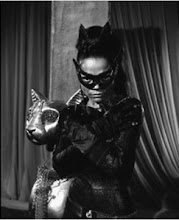 |
| Malcolm McLaren and Vivianne Westwood's shop, 1974-1976 |
There's a new exhibition coming up at the Metropolitan Museum of Art on the influence of punk in fashion called Punk: Chaos to Couture. It brings up a lot of issues on the appropriation and commercialization of a subculture. What does it mean when "punk" is The Ramones, Vivienne Westwood and April Lavigne (I'm no expert, but doing infomericals for an acne treatment is not punk rock). In a New York Magazine survey, "punk" was defined as: a type of music, a political act, a lifestyle, a state of mind and a way of dressing.
And all of the above.
I think the same thing can be said for BDSM. I consider BDSM to be a sexual activity, a political act, a lifestyle, a state of mind, and a way of dressing. But I identify as kinky and those in the survey identified as punk. What about people who don't? What punk was and what punk is are different things. Or are they?
CBGBs is a JohnVarvatos store and The Hellfire Club is a Dos Caminos restaurant and I was too young to go to either of them in their heyday. If only there was a kinky Jane Jacbos around to fight for the preservation of New York BDSM clubs.
I was having a conversation with a friend on whether or not kink is going "mainstream". I don't think so. 50 Shades of Grey is the Hot Topic of kink.
I think the popular conception of BDSM is very focused on what people do and wear and not so much about
what it means psychologically or emotionally. Having a mohawk
and a safety-pin through your nose doesn't make you punk rock and owning a flogger and a leather corset doesn't make you kinky. Sales of
fake handcuffs and butt-plugs might go up for a bit, but I don't think more people are
going to suddenly become sadists, masochists, dominants and submissives. I think some people might think it's weird, some people might try it out once or twice on Valentine's Day, and a few might think, "Yes! This is it!".
What I hope is that BDSM becomes more accepted and kinky people less marginalized. But I'm not all that worried about it becoming mainstream. The day I see Madison Young in a Proactiv commercial is the day I'll start getting worried.









